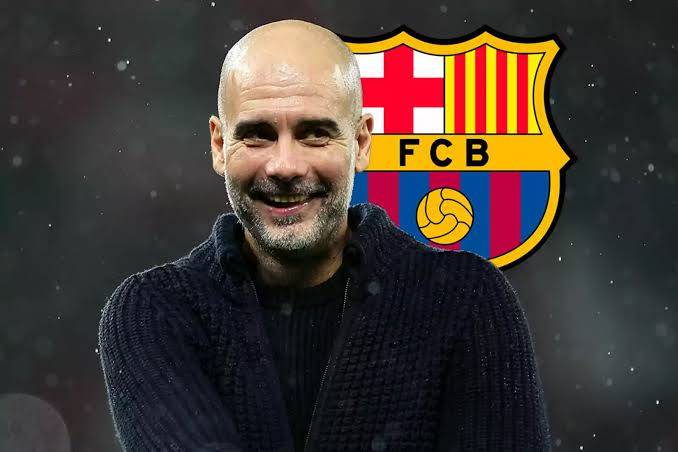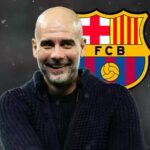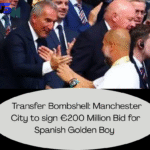Manchester City considering a €100 million bid for ‘untouchable’ Barcelona Star

The summer transfer window continues to generate headlines across European football, with one of the most intriguing stories emerging from Manchester involving Barcelona’s midfield maestro, Pedri González. Manchester City’s reported interest in the 22-year-old Spanish international has sent shockwaves through the football world, with speculation mounting over a potential €100 million bid that could test Barcelona’s resolve to keep their prized asset.
This transfer saga represents more than just another big-money move in modern football. It encapsulates the ongoing evolution of both clubs’ strategic visions, the generational transition happening at Manchester City, and Barcelona’s determination to rebuild around their most precious talents. The story of City’s pursuit of Pedri is ultimately a tale of two clubs at different crossroads in their respective journeys.
Manchester City’s Strategic Vision: Planning for the Post-De Bruyne Era
Manchester City’s interest in Pedri stems from a carefully calculated long-term strategy orchestrated by Pep Guardiola and the club’s hierarchy. Kevin De Bruyne, the Belgian maestro who has been the creative heartbeat of City’s midfield for nearly a decade, finds himself at a crucial juncture in his career. With his contract set to expire at the end of the current season and no concrete renewal discussions publicly acknowledged, City’s leadership has begun the meticulous process of identifying and pursuing his potential successor.
The 33-year-old De Bruyne has been instrumental in City’s unprecedented success over the past several years, contributing to multiple Premier League titles, domestic cups, and the long-awaited Champions League triumph. His ability to dictate tempo, create chances from seemingly impossible situations, and provide leadership on the pitch has made him irreplaceable in many ways. However, the harsh reality of football is that even the greatest players eventually face the inevitable passage of time.
City’s pursuit of Pedri represents a proactive approach to squad planning that has become a hallmark of their operations under the current ownership. Rather than waiting until De Bruyne’s departure becomes imminent, the club is positioning itself to secure a seamless transition that maintains their competitive edge across all competitions. This forward-thinking strategy reflects the club’s ambition to remain at the pinnacle of European football for years to come.
The choice of Pedri as their primary target speaks volumes about City’s recruitment philosophy and their understanding of modern football’s tactical demands. The young Spaniard possesses many of the qualities that have made De Bruyne so effective, while also bringing his own unique skill set that could potentially elevate City’s playing style to new heights.
Pedri: The Golden Boy of Spanish Football
Pedro González López, known simply as Pedri, has emerged as one of the most exciting prospects in world football since his breakthrough at Barcelona. Born in Tegueste, Tenerife, the midfielder’s journey to the top of European football reads like a modern fairy tale, characterized by rapid development, exceptional performances, and a maturity that belies his young age.
Since joining Barcelona from Las Palmas in 2020, Pedri has consistently exceeded expectations and established himself as a cornerstone of both club and country. His technical ability, vision, and football intelligence have drawn comparisons to some of the greatest midfielders in Barcelona’s illustrious history, including legends like Xavi Hernández and Andrés Iniesta. These comparisons, while flattering, also highlight the immense pressure and expectations that come with wearing the famous Blaugrana jersey.
The current season has been particularly remarkable for Pedri, who has featured in 44 of Barcelona’s 45 matches across all competitions, missing only one game against Valencia due to illness. This incredible availability and consistency demonstrate not only his physical resilience but also his importance to Hansi Flick’s tactical system. Under the German coach’s guidance, Pedri has flourished, showcasing an expanded skill set that includes improved defensive contributions alongside his already exceptional creative abilities.
Pedri’s performances have been so outstanding that he has entered discussions for individual honors, including potential Ballon d’Or consideration. While winning football’s most prestigious individual award at such a young age would be extraordinary, his consistent excellence throughout the season has made such speculation realistic rather than merely aspirational.
The midfielder’s style of play perfectly embodies the Barcelona philosophy of possession-based football, technical excellence, and intelligent movement. His ability to receive the ball in tight spaces, turn under pressure, and find teammates with precise passes has made him indispensable to Barcelona’s attacking patterns. Moreover, his work rate and pressing have evolved significantly, making him a more complete player who contributes effectively in all phases of the game.
Barcelona’s Unwavering Stance: Protecting Their Crown Jewel
Barcelona’s response to Manchester City’s interest has been swift and unequivocal. The Catalan giants have made it crystal clear that Pedri is not for sale at any price, describing him as “untouchable” and firmly rejecting any notion of his departure. This stance reflects both the player’s immense value to the club and Barcelona’s broader strategic vision for the future.
The club’s determination to retain Pedri is understandable when considering his integral role in their recent resurgence. After several seasons of financial difficulties and on-field struggles, Barcelona has begun to rediscover their identity and competitive edge. Central to this revival has been the emergence of young talents like Pedri, who represent both the present and future of the club.
Barcelona’s confidence in rejecting potential offers is bolstered by Pedri’s recent contract extension, which ties him to the club until 2030. This long-term commitment provides the club with significant leverage in any potential negotiations and demonstrates the mutual trust between player and institution. The contract extension also reflects Pedri’s own commitment to the Barcelona project and his belief in the club’s direction under current management.
The financial aspects of Pedri’s contract renewal also play a crucial role in Barcelona’s negotiating position. While the exact details remain confidential, the improved terms likely reflect his increased importance to the team and provide him with compensation befitting his status as one of Europe’s premier midfielders. This financial commitment from Barcelona demonstrates their willingness to invest in their key players and compete with the wealthiest clubs in the transfer market.
Barcelona’s stance also reflects their understanding of Pedri’s unique value within their tactical system. Under Hansi Flick’s guidance, the team has developed a style of play that maximizes Pedri’s strengths while providing him with the support necessary to excel. Replacing such a player would be incredibly difficult, if not impossible, regardless of the financial resources available.
The Financial Dynamics: €100 Million and Modern Football Economics
The reported €100 million valuation attached to Manchester City’s potential bid reflects the current state of the football transfer market, where exceptional young talents command unprecedented fees. This figure, while substantial, is not entirely surprising given Pedri’s age, ability, contract situation, and potential for further development.
From Manchester City’s perspective, the investment would represent more than just acquiring a talented player; it would be a statement of intent regarding their long-term ambitions. The club has demonstrated repeatedly that they are willing to invest heavily in players who fit their strategic vision, and Pedri certainly meets those criteria. The potential transfer fee, while significant, would likely be structured over several years and could include performance-related bonuses that would make the deal more palatable for both parties.
For Barcelona, the financial temptation of such an offer cannot be entirely dismissed, despite their public stance. The club has faced well-documented financial challenges in recent years, and a €100 million injection could provide significant flexibility in their own transfer activities. However, the long-term cost of losing Pedri would likely far exceed any short-term financial benefits, making the decision to reject such offers strategically sound.
The broader implications of this potential transfer extend beyond the immediate parties involved. A successful bid from Manchester City would set new benchmarks for midfielder valuations and could trigger a domino effect throughout the transfer market. Other clubs with similar profiles and ambitions would be expected to respond with their own significant investments, potentially inflating the market further.
Tactical Analysis: How Pedri Would Fit into Guardiola’s System
Pep Guardiola’s tactical system at Manchester City has evolved significantly over his tenure, adapting to different personnel and opposition challenges while maintaining core principles of possession-based football, positional play, and high pressing. Pedri’s skill set and playing style would integrate seamlessly into this system, potentially providing Guardiola with even more tactical flexibility and creativity.
The Spanish midfielder’s ability to operate in multiple positions across the midfield and attacking lines would give Guardiola numerous options for team selection and in-game adjustments. Pedri’s experience playing in various roles for both Barcelona and the Spanish national team demonstrates his tactical intelligence and adaptability, qualities that Guardiola values highly in his players.
In City’s typical 4-3-3 formation, Pedri could operate as either a central midfielder or in a more advanced role, depending on the specific requirements of each match. His passing range and vision would allow him to function as a deep-lying playmaker, while his dribbling ability and goal threat would make him effective in advanced positions. This versatility would provide Guardiola with the tactical flexibility he craves and could lead to the development of new attacking patterns and combinations.
The potential partnership between Pedri and existing City players like Rodri, Bernardo Silva, and Phil Foden would be particularly intriguing from a tactical perspective. The combination of technical ability, work rate, and football intelligence possessed by these players could create one of the most formidable midfield units in world football.
The Broader Implications: A Transfer That Could Reshape European Football
The potential transfer of Pedri from Barcelona to Manchester City would have ramifications that extend far beyond the two clubs directly involved. Such a move would represent a significant shift in the balance of power within European football and could influence the strategic decisions of other major clubs across the continent.
For La Liga, losing one of its brightest stars to the Premier League would be another blow to the competition’s global prestige and commercial appeal. The Spanish league has already seen several high-profile departures in recent years, and Pedri’s potential move would continue this concerning trend. The financial disparity between the Premier League and other European leagues has become a significant factor in player retention, and this transfer would highlight these growing inequalities.
From Manchester City’s perspective, successfully acquiring Pedri would further cement their status as one of the world’s premier destinations for elite talent. The club’s ability to attract and retain the best players has been crucial to their sustained success, and adding Pedri to their ranks would send a strong message to competitors and potential future targets.
The transfer would also have implications for the Spanish national team, where Pedri has become an increasingly important figure. While he would continue to represent his country regardless of his club situation, the tactical and developmental benefits of remaining in Spanish football could be significant for both player and national team.
Conclusion: The Future of a Generational Talent
As this transfer saga continues to unfold, several key factors will ultimately determine its outcome. Barcelona’s unwavering public stance suggests that they are prepared to resist even the most tempting offers, while Manchester City’s reported interest demonstrates their commitment to planning for the future.
Pedri himself remains the central figure in this drama, and his own preferences will ultimately prove decisive. His recent contract extension with Barcelona suggests a strong commitment to the club, but the allure of working with Pep Guardiola and competing for the highest honors with Manchester City could potentially influence his thinking.
The coming months will likely see continued speculation and rumor, but the fundamental dynamics appear unlikely to change significantly. Barcelona views Pedri as essential to their future success and has the contractual security to resist external pressure. Manchester City, while undoubtedly interested, may ultimately need to look elsewhere for their long-term midfield solution.
Regardless of the eventual outcome, this transfer saga has highlighted the exceptional talent of Pedri and the high regard in which he is held by Europe’s elite clubs. At just 22 years old, he has already established himself as one of the world’s premier midfielders, and his future achievements seem limited only by his own ambitions and the opportunities presented to him.
The story of Manchester City’s pursuit of Pedri ultimately reflects the broader evolution of modern football, where the world’s best players are increasingly concentrated among a small number of elite clubs. Whether this particular transfer materializes or not, it serves as a fascinating case study in the complex dynamics that drive the contemporary football transfer market and the strategic decisions that shape the sport’s future landscape.















